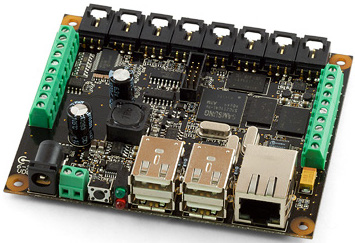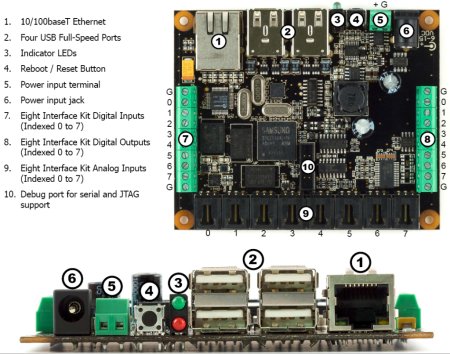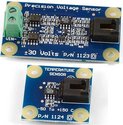Linux-ready SBC controls robots, sensor networks
Sep 30, 2009 — by Eric Brown — from the LinuxDevices Archive — 23 views[Updated: Oct. 2] — Phidgets, Inc. is shipping an ARM9-based single board computer (SBC) that runs Linux and targets sensing and control applications, including robotics. The “1070 – PhidgetSBC” is equipped with an Ethernet port, four USB ports, and a WiFi USB adapter, and is available with an integrated PhidgetInterfaceKit 8/8/8 I/O board.
The Linux-friendly Phidget line of USB-based sensing and control modules is used by hobbyists, robot-makers, and software developers, says the company. Phidgets, however, have always required tethering to a desktop computer via USB. Now Calgary, Alberta-ased Phidgets, Inc. is offering its first standalone SBC model, a full embedded computer that runs a Linux and which connects to a computer network via Ethernet or WiFi.

PhidgetSBC
As a result, the range of a Phidget network can now be extended well beyond USB's 16-foot maximum. The USB ports also connect additional devices such as the supplied 802.11b/g USB wireless adapter, enabling remote control, or industry standard webcams, which are supported in firmware.

PhidgetSBC detail
(Click to enlarge)

PhidgetSBC and accessories
(Click to enlarge)
 |
The PhidgetSBC provides a custom Linux distribution built using Buildroot, and "exposes an easy to use interface for setting up and running custom applications on-board," says Phidgets. Applications written in either Java or C are supported with full shell access via a built-in SSH server. There are also GCC and development tools, the GDB debugger, and Linux command line tools, says the company.
The PhidgetSBC is said to be capable of operating autonomously, without the need for a GUI or remote connection. Applications include a variety of sensor networks, as well as robotics, where the combination of the SBC, WiFi, connected sensor modules, and webcams enable a remote controlled robot, says the company.
Phidget modules purchased for use with the PhidgetSBC can also be controlled via a PC, using an application programming interface (API) that allows applications to be developed in .NET, Visual Basic, VBA, LabView, Java, Delphi, C and C++. Desktop operating systems supported include Linux, Windows XP, Windows Vista, Windows CE, and OSX, according to the company.
Availability
The 1070 – PhidgetSBC is shipping now, with pricing from Phidgets listed at $265 Canadian (one unit), $257 Canadian (five or less units), or $252 Canadian (10 or less). Robotics distributor Trossen Robotics offers the units at $244 (US) apiece.
More information may be found at Phidgets, here, or at Trossen Robotics, here.
This article was originally published on LinuxDevices.com and has been donated to the open source community by QuinStreet Inc. Please visit LinuxToday.com for up-to-date news and articles about Linux and open source.